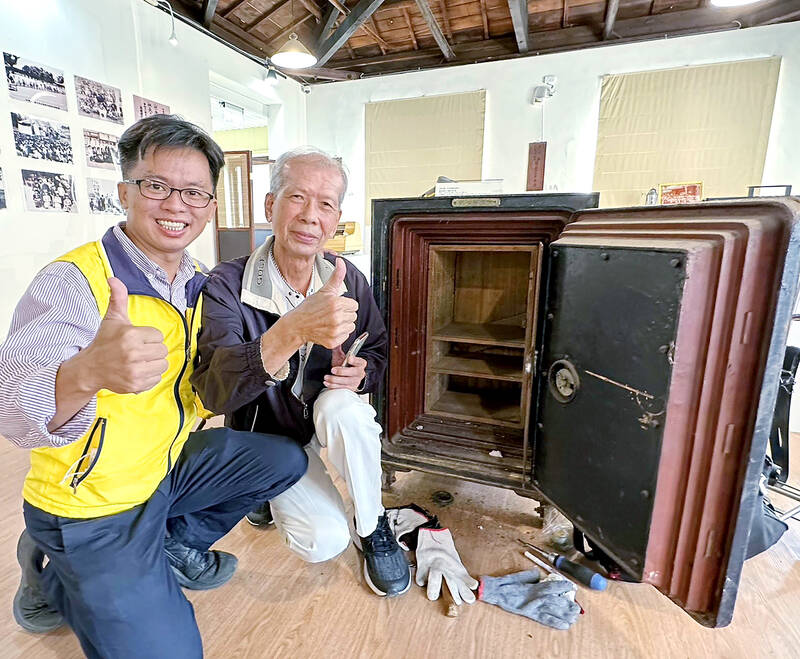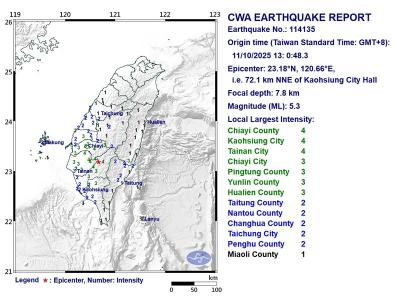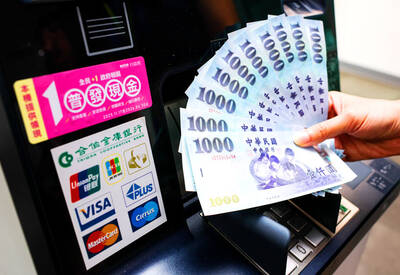A safe in Changhua County’s Fenyuan Township (芬園) that had baffled locksmiths has been opened after the township office raised the reward for opening it from NT$5,000 to NT$10,000.
The safe was cracked by an 80-year-old locksmith from Taichung surnamed Wang (王), who used a skeleton key that he said he has been using for 30 years.
Sitting on a folding seat in front of the safe, Wang alternated between working the combination lock and tapping the safe in different areas with a mallet. He managed to open the safe after 40 minutes, but found it to be completely empty.

Photo: Tang Shih-ming, Taipei Times
“There had been rumors in the township that the safe contained gold bars, so some people were quite disappointed that this was not the case,” township Mayor Lin Shih-ming (林世明) said.
After the office doubled the reward, news spread fast.
Wang said that friends and relatives approached him, telling him to take on the challenge.
He said he expected it would be no easy task to open the century-old safe, and brought a variety of tools to try, including a file, needle oiler, a mallet and his skeleton key.
After getting the safe open, he immediately made a video call to his daughter to share the news, he added.
He has been working with locks and safes since he was 13 years old, and has unlocked many safes and ATMs, Wang said, adding that he has a safe at home similar to the one at the township office.
“Nearly 10 people tried to unlock this safe before Wang, but they all failed,” Lin said. “Although people were disappointed that there was no gold or money in the safe, it was still a joy to see the inside of it after all these years.”
The safe, which had been used by the township office during the Japanese colonial era, had been exhibited with other historical items used by the office.

The Central Weather Administration (CWA) today issued a sea warning for Typhoon Fung-wong effective from 5:30pm, while local governments canceled school and work for tomorrow. A land warning is expected to be issued tomorrow morning before it is expected to make landfall on Wednesday, the agency said. Taoyuan, and well as Yilan, Hualien and Penghu counties canceled work and school for tomorrow, as well as mountainous district of Taipei and New Taipei City. For updated information on closures, please visit the Directorate-General of Personnel Administration Web site. As of 5pm today, Fung-wong was about 490km south-southwest of Oluanpi (鵝鑾鼻), Taiwan's southernmost point.

Almost a quarter of volunteer soldiers who signed up from 2021 to last year have sought early discharge, the Legislative Yuan’s Budget Center said in a report. The report said that 12,884 of 52,674 people who volunteered in the period had sought an early exit from the military, returning NT$895.96 million (US$28.86 million) to the government. In 2021, there was a 105.34 percent rise in the volunteer recruitment rate, but the number has steadily declined since then, missing recruitment targets, the Chinese-language United Daily News said, citing the report. In 2021, only 521 volunteers dropped out of the military, the report said, citing

A magnitude 5.3 earthquake struck Kaohsiung at 1pm today, the Central Weather Administration said. The epicenter was in Jiasian District (甲仙), 72.1km north-northeast of Kaohsiung City Hall, at a depth of 7.8km, agency data showed. There were no immediate reports of damage. The earthquake's intensity, which gauges the actual effects of a temblor, was highest in Kaohsiung and Tainan, where it measured a 4 on Taiwan's seven-tier intensity scale. It also measured a 3 in parts of Chiayi City, as well as Pingtung, Yunlin and Hualien counties, data showed.

Nearly 5 million people have signed up to receive the government’s NT$10,000 (US$322) universal cash handout since registration opened on Wednesday last week, with deposits expected to begin tomorrow, the Ministry of Finance said yesterday. After a staggered sign-up last week — based on the final digit of the applicant’s national ID or Alien Resident Certificate number — online registration is open to all eligible Taiwanese nationals, foreign permanent residents and spouses of Taiwanese nationals. Banks are expected to start issuing deposits from 6pm today, the ministry said. Those who completed registration by yesterday are expected to receive their NT$10,000 tomorrow, National Treasury